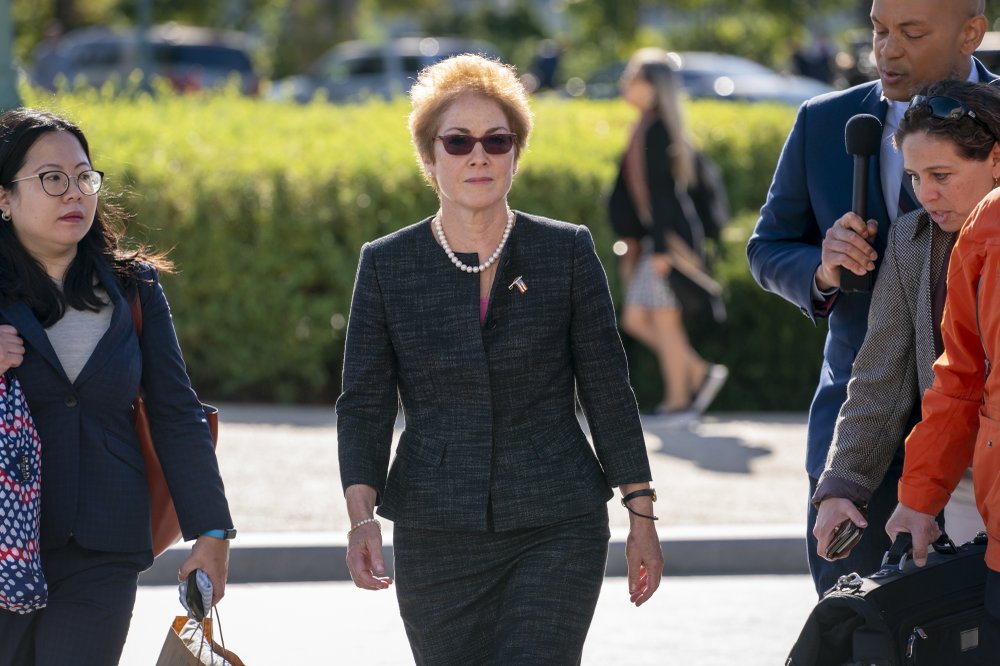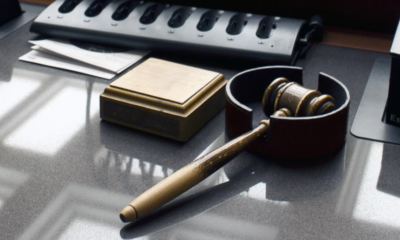National
Ousted ambassador to testify in Trump impeachment probe

WASHINGTON (AP) — The House will hear from a singular witness Friday in the Trump impeachment hearings: Marie Yovanovitch, the former U.S. ambassador to Ukraine who was targeted by the president’s allies in a “smear” campaign now central to the inquiry.
The career diplomat, who served both Republican and Democratic presidents, is expected to relay her striking story of being suddenly recalled by Donald Trump and told to “watch my back” in a swiftly developing series of events that sounded alarms about the White House’s shadow foreign policy.
She and other officials now testifying publicly in the historic House hearings scrambled to understand Trump’s actions, providing revelatory accounts that Democrats are now relying on to make the case that the president’s behavior is impeachable.
In particular, Yovanovitch and others have described Rudy Giuliani, Trump’s personal lawyer, as leading what one called an “irregular channel” outside the diplomatic mainstream of U.S.-Ukraine relations. Asked during her closed-door deposition if anyone at the State Department who was alerted to Giuliani’s role tried to stop him, she testified, “I don’t think they felt they could.”
With the start of a second day of historic hearings to consider removal of America’s 45th president, Democrats and Republicans are hardening their messages to voters as they try to saw public opinion.
Americans are deeply entrenched in two camps over impeachment, resulting in a mounting political battle that will further test the nation in one of the most polarizing eras of modern times.
House Speaker Nancy Pelosi on Thursday brushed aside the Latin phrase “quid pro quo” that Democrats have been using to describe Trump’s actions with a more colloquial one: Bribery.
“Quid pro quo: Bribery,” Pelosi said about Trump’s July 25 phone call in which he asked Ukrainian President Volodymyr Zelenskiy for a favor.
Trump says the call was perfect. Pelosi said, “It’s perfectly wrong. It’s bribery.”
Trump continued to assail the proceedings as “a hoax” on Thursday, and House GOP Leader Kevin McCarthy dismissed the witness testimony as hearsay, at best second-hand information.
“Beltway charade,” the president’s son, Eric Trump, told reporters. He said good, hard-working Americans “don’t give a damn about that stuff.”
At its core, the impeachment inquiry concerns Trump’s July phone call with Zelenskiy that first came to attention when an anonymous government whistleblower filed a complaint.
In the phone conversation, Trump asked for a “favor,” according to an account provided by the White House. He wanted an investigation of Democrats and 2020 rival Joe Biden. Later it was revealed that the administration was also withholding military aid from Ukraine.
“The bribe is to grant or withhold military assistance in return for a public statement of a fake investigation into the elections,” Pelosi said. “That’s bribery.”
It’s also spelled out in the Constitution as one of the possible grounds for impeachment — “treason, bribery or other and high crimes and misdemeanors.”
Rep. Jim Himes, D-Conn., a member of the Intelligence Committee conducting the hearings, explained the shift: “English words are easier to understand than Latin words.”
The president flatly denied the latest revelations. During Wednesday’s hearing, William Taylor, the top diplomat who replaced Yovanovitch in Ukraine testified that another State Department witness overheard Trump asking about “the investigations” the day after his phone call with Kyiv.
“First I’ve heard of it,” he said, brushing off the question at the White House.
The Associated Press reported Thursday that a second US Embassy official also overheard Trump’s conversation.
During the first day of testimony, Taylor and another seasoned foreign service officer, George Kent, the deputy assistant secretary of State, delivered somber accounts about recent months.
They testified in defense of Yovanavitch amid what Kent called Giuliani’s “smear” campaign against her; about the dangers of abandoning Ukraine as it faces Russia; and of what Taylor called an “irregular channel” of foreign policy orchestrated by the president’s lawyer and carried out by other Trump allies.
It’s a dramatic, complicated story, and the Democrats’ challenge is to capture voter attention about the significance of Trump’s interactions with a distant country.
Ukraine, a young democracy with a hostile Russia at its border, is relying on the U.S. as it reaches to the West.
While Trump applauded the aggressive stance of some of his GOP defenders, he felt that many of the lawmakers in the opening hearing could have done more to support him and he pressed that case with congressional allies ahead of Friday, according to Republicans who were not authorized to speak publicly about private conversations and were granted anonymity.
Still, Trump’s reelection effort raised more than $3 million on the first day of public impeachment hearings, and campaign manager Brad Parscale announced it now hopes to raise $5 million within a 24-hour span.
Behind closed doors this week Pelosi reminded Democratic lawmakers of the importance of presenting a “common narrative” to the public as the proceedings push forward, according to a Democratic aide.
“We’re in Chapter One of a process,” said Rep. Raja Krishnamoorthi, D-Ill., a member of the Intelligence Committee conducting the inquiry. The challenge, he said, is educating Americans about what happened “and then explaining why it matters.”







